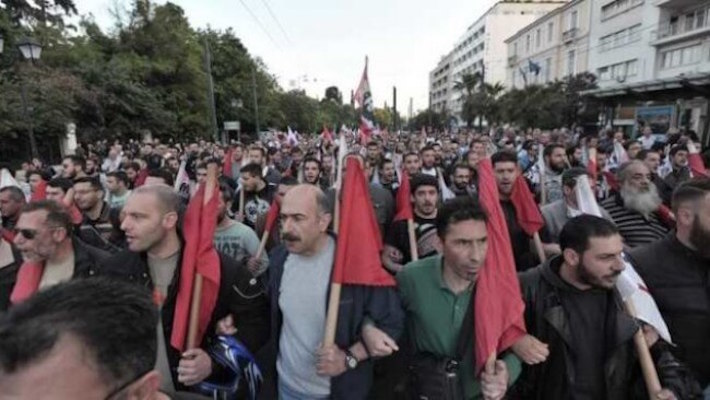By Dimitris Konstantakopoulos (*)
Greece remains one of the most important places on earth. Not because of the country per se, but because it is the laboratory where the future political and social regime of all Europe is now taking shape (much as Spain in 1936-39 was the laboratory for what was going to come to all the continent, then by military, now by financial and political-communication means).
Eleven million Greeks have now become the object of an unprecedented historical experiment. The purpose of it is the creation, with formal popular “consent”, if possible, of a new system of “governance”, democratic in form, totalitarian in nature. They try to create a kind of “virtual democracy” and even “virtual nation”. The Greek population is invited to accept “voluntarily” an unprecedented, for peace times, fall of its living standards, the loss of political and social rights earned during a century and the loss of its sovereignty, popular, state and national.
If Greece is so important, ideas about Greece are also very important. This is why we are watching in the international media not so much distortions of what is really happening (they exist also), as distortions of the meaning of what is happening.
Take for instance the French Liberation, a newspaper founded by Jean-Paul Sartre and owned by the Rothschild’s. It is describing recent elections in Greece as a triumph of the left! If there is really a triumph, it is hardly of the left, it is rather a triumph of Rothschild’s themselves and their likes.
For the Greek Left, the Greek people and their nation, for Greek and European democracy and also for the idea of a democratic and independent Europe, what has happened this summer in Greece is a historic disaster, the consequences of which will be felt soon all around Europe.
The only way to attenuate the consequences of such a historic defeat is to speak truth, not to try to dissimulate the meaning of what happened, as do many people in Europe, including many leftist politicians and intellectuals. To study in a very serious, uncompromising way what has really happened and why it happened and draw the necessary conclusions. “Don’t laugh, don’t cry, understand”, as Spinoza was saying.
Millions of Greeks will pay an enormous price in their personal and family life for their defeat (by betrayal and because their leadership believed blindly assurances from US and obscure financial circles). At least, let this price contribute to the understanding of what and why went wrong and how to be more successful, next time Greeks or another nation of Europe are going to confront directly our present-day “financial totalitarianism”.
Ok, you may say, all this seems logical, still Greeks do not seem to endorse after all Tsipras and his policy, by giving him an unexpected electoral victory? And, in any case, their electoral behavior is not an indirect proof that “There is No Alternative” than to succumb to the desiderata of world finance and of Germany, to use the famous Thatcher’s TINA formula? Those are the conclusions dominant forces in Europe want all Europeans to draw from the Greek/European summer crisis.
The electoral victory of Tsipras
Greeks gave indeed to Tsipras an electoral victory. This victory provoked a huge impression, because it followed the capitulation and U-turn of the leader who personified the resistance to the policy of the Memorandums.
In reality the extent of this victory is rather limited. Less than 20% of the eligible voters have casted their ballots for SYRIZA, an all-time low for a governing party. SYRIZA took 15% less votes than last January. Less than 50% of the voters participated in the elections, which is also a record abstention for all post-war history, including 1946 elections boycotted by the Left. (1)
We must also keep in mind, while analyzing this result, the enormous disappointment, confusion and shock provoked in Greece after the capitulation of Tsipras in July and the betrayal of the more than clear mandate of the referendum. Tsipras himself (or rather his communication specialists, with skills that no Greek disposes) has said after the capitulation that, if he insisted on the resistance line, the country would collapse, it would become ungovernable, it would be thrown away from eurozone and would fall into a civil war! A kind of “political terrorism” was launched against the Greek people, as before the referendum. But now the result was devastating, because it was coming from the leader of the resistance himself! To understand the psychological effect try to imagine what would happen if De Gaulle or Churchill, at the most critical moment of the war, they signed suddenly a capitulation, explaining that there is not any alternative than to satisfy German terms, otherwise total catastrophe was waiting France or Britain. Or just remember what happened to the USSR when its leader and his television begun to propagate the idea his own regime was much worse than the western one!
In some situations, reality is so bad that people do not like to believe it, especially if they don’t have any way to confront it. They fall into “sleep”, exactly the way a person wakes up when he sees a terrible nightmare. And anyway, the pratical results of the Tsipras capitulation are, for the time being, hidden in the terms of the new agreement, they did not have any impact on the life of people.
In reality, what we have in Greece is an even bigger “miracle” of manipulation technologies than what happened at the end of USSR. Not only this Greek “Gorbachev” was able to disseminate confusion and disarray to his own camp, he was able to use it in order to consolidate his own position! Gorbachev has passed into oblivion very quickly. This is very probably what will happen at the end with Tsipras, but, for the time being, he is very much with us, against all odds. How he was able to do it?
What was SYRIZA?
A crucial factor which permitted Tsipras to do it was the absence of any credible alternative scheme or party to follow on the struggle against the Memorandum policy. SYRIZA dissidents failed miserably by de facto accepting all the time the negotiating line of Tsipras and the fact he took alone all the decisions about negotiations, outside the control of any party organ. Dissidents did not predict, did not warn and did nothing to prevent the capitulation. When it came they failed miserably to react to it in any coherent and convincing way.
We should keep in mind that SYRIZA has never been a mass or a democratic party. De facto the party was run by Tsipras himself and very few close friends of him. They took all fundamental political decisions, going from time to time to conferences or the Central Committee meetings, just to endorse them a posteriori. Sometimes they did not do even that. In the rank and file of this party, a remnant essentially of the once strong Greek Communist Party with some additions, you will find a lot of militants devoid to their cause. But the apparatus was run by a group of incompetent, in their great majority, professional bureaucrats, who have not produce any new idea for the last three decades at least! These people were opposed to any kind of opening to society after the first electoral rise of 2012, being afraid they would lose their future portfolios in the government. They have completely failed in getting the control of most trade unions or other social organizations, or produce a newspaper which people would buy.
Various tendencies inside the party were satisfied by the situation and they practically accepted it, or at least they did not do anything meaningful to change it. In exchange they got their power quotas in the party (and then government) apparatus. At most, “dissidents” were submitting some proposals in the CC, they were rejected and everybody was satisfied.
Syriza became what it became not because, but in spite of its own qualities. It became for four main reasons.
First, the collapse of all the Greek political system as a result of the catastrophic results of the program the Creditors have imposed and successive Greek governments have applied.
Second, the personal dynamism, the “charisma” and the enormous ambition of a young person, who was able to crystallize the hope that maybe he can do something to stop the disaster unfolding in the country.
Third, the fact that this person was free from all political, ideological or moral restraints and limitations of the older leftist generation, for good and for bad. In his quest to ascend, he was sufficiently intelligent to adopt (rather to “copy paste” it would be more exact) and apply a number of critical ideas and slogans, including the need to stop in a radical way the catastrophic policy imposed to Greece and also the need to defend the nation itself, as it was the Greek nation itself which was attacked by this program. He did that through the critique to the Memoranda from the viewpoint of the country as a whole, not of its poorer classes. He spoke to and about the “nation”, without even using this word but the unconscious message was clear.
These ideas were not developed by any of the SYRIZA tendencies and they were not even understood by them. They were developed by Spitha and by a number of critical intellectuals. It is in their texts you will find them. For example, Tsipras used often the term “debt colony”. There is not such a term and any analysis what it means, in any party document! Sometimes you don’t find in those documents even the terms used by Tsipras, like “debt colony”.
Unfortunately, Tsipras adopted only the slogans and he just expressed verbally the ideas. He did not assimilate, or did not want to assimilate their rational or prepare for that matter his party seriously for the struggle those ideas implied – probably he could not also do it. Anyway, the end result was that he used them just for his and his party’s ascension to power.
Fourth, the enormous moral capital SYRIZA has inherited from the past struggles of the leftist rank and file and which helped it win the confidence of large parts of the population, especially after the collapse of PASOK. The leadership of the Greek CP, the first by far political force in the ’40s, has committed all possible mistakes and even “betrayals”. Still leftist militants in Greece have, time and again, struggled in the most heroic way, earning even the respect of their opponents. About four thousand of them, detainees faced with the choice to sign a declaration denouncing communism and go home or go the firing squad, they have chosen to be executed – and some of them they were not even communists.
This was a fundamental reason why the ideas of the Left remained ideologically dominant in Greece, the decades after the communist defeat in one of the most horrible civil wars Europe has known.
The complete failure of the “dissidents”
The fact that the ideas and the slogans of SYRIZA have been adopted by Tsipras and imported and imposed upon his party was a fundamental reason why dissidents inside SYRIZA were unable to resist in any way the final capitulation. Tsipras made the antimemorandum SYRIZA. He was the only one who could destroy it.
Dissidents had already de facto accepted that Tsipras himself decided a negotiating line which had little meaning and also that he has personally chosen his negotiators. The dissidents did not criticize the line, they did not predict the possibility of a final disaster and they did not do anything serious to stop it.
When the final defeat came, they were too slow and too shy to react. It took many days to the majority of the members of the Central Committee (which was never convened by Tsipras to discuss what he was doing) to sign a text expressing their disagreement with the agreement with creditors and ask for a the CC to convene. Lafazanis himself spoke at one point of “internal divisions which strengthen the Left”, emphasizing the importance of keeping the Left united! All dissidents avoided any personal attack on Tsipras.
The critique was so mild it served indirectly as an argument to Tsipras. If you believe a huge betrayal is happening, you should react in a very dynamic way, using all available and even unavailable means. If you don’t do it, you send the signal “after all nothing very important has been done”, or, alternatively, “after all Tsipras could not do anything more”.
When Tsipras decided to call early elections, the “Left Platform” of SYRIZA, afraid that they would simply be thrown out of the party electoral lists, announced the creation of a new party “Popular Unity”. But they did all the political mistakes they could. First, they decided themselves who would be the leader of the party, its name and its program, then they invited other people to cooperate. They appointed as candidates the SYRIZA deputies who disagreed with the capitulation, thus renouncing to any significant social and political enlargement of their scheme.
Popular Unity said that it wanted to constitute a new “front of No” to the Creditors. In reality they tried to create a highly centralized and rather traditional leftist party. But people did not vote SYRIZA in January 2015 or “No” in July 2015 because they became leftists. They voted to stop the disaster unfolding on their country.
Popular Unity was also trapped inside the absolute and sectarian position it adopted about return to a national currency. This was exactly where Tsipras wanted them to be.
By acting in such a way, dissidents, and especially Popular Unity not only they were unable to express any significant part of the “No” vote in the referendum, but they helped and partially legitimized Tsipras’s position. “Look to my opponents, the supposed alternative. Do you prefer those guys than me? Do you trust them? No. So I was right to sign the agreement”, went his communication message.
In such conditions, the protest against the capitulation had not the possibility to be politically articulated and expressed in any satisfactory way. It resulted in an increase of abstention, a huge number of null or invalid ballots (nearly 5%) and an equal percentage of bulletins for parties of political clowns or unimportant ones.
The Tsipras campaign
This was a necessary but not still sufficient condition for Tsipras to win the elections. Having stabilized his own party and ranks, he launched then an electoral campaign putting the voters in front of the following dilemma
“Are you going to support old parties like New Democracy, which, along with PASOK, are responsible for the situation of the country and which are promising you nothing else than to adhere strictly to the terms I agreed? Or you are going to give me a second chance and permit me to try to apply in a more just way what I signed, trying probably to change some of the terms of the agreement, to find equivalents or to fight against corruption and make the rich pay more of the burden?”
All this is going to be proved a big illusion, still many people would choose an illusion than the certainty of a miserable reality, without an apparent way out. He was also greatly helped to put things that way by all the media establishment, which, based on fake polls, described the elections as a fight neck to neck between SYRIZA and New Democracy. This proved once more how concentrated and highly controlled (by not only Greek power centers) is power game in Greece.
There is also another reason that some Greek voters voted for Tsipras in spite of his capitulation. Greece is going throught an “existential” crisis of “Weimar” type. It is not a “usual” country in a “usual” crisis. In such conditions, the most decisive leader has always a huge advantage.
A Triumph or a Tragedy?
Anyway the Creditors have a huge interest in putting the “Left” to apply one of the most extremist neoliberal programs has ever appeared. (“I hope Tsipras will win and he will apply all that he signed. He will be humiliated and destroyed. This is the only way to get rid of him”. told me on the eve of the elections a businessman closely connected to ND). For Americans, who have an enormous influence in the milieu of the SYRIZA leader, the Tsipras-Kammenos government seemed also, for a variety of important strategic reasons, the best solution.
The role of US administration
We don’t have here the space to develop one of the main, fundamental aspects of what happened in Greece and Europe this summer, which is the behind the scenes role of the US. Not believing in his own or the capacities of his party and his country, full of illusions about the role of Europe and America but wishing also to take power at any cost, Mr. Tsipras has not prepared himself, his party or his country for what a demand to stop the neocolonial relationship would require. Instead he blindly trusted Americans and obscure financial circles.
There is a lot of indications that things happened this way. Yannis Dragasakis himself, has thanked in public US administration for its role in the achievement of the final agreement-capitulation. In the prestigious, conservative newspaper Kathimerini (27.9.2015) was leaked and published a long report by the Greek ambassador to Washington, written on 16th of July, days after the capitulation. From the content it becomes clear that the Greek government was acting in close cooperation, somehow under the “guidance” of USA administration during all the negotiation. (There was also close cooperation of Washington with other European actors, especially Paris and Rome). This report tends to substantiate the thoery that all “openings” of Athens to Russia were nothing but a game used to exert pressure on Germany (and also a game to lure Greek public opinion). America and some obscure financial circles were able in fact to use SYRIZA leaders in order
– to divert Greek “rebellion” and make it un-harmful for the European neoliberal order
– to inflict on Germany and Europe (and Greek/European left) a huge political defeat, probably the biggest after the 2nd WW. A lot of Europeans believe now Germany is not a good power
– to deter any Greek-Russian rapprochement
If there is a triumph, this is it.
Prospects
The September elections were by no means the end of the Greek/European crisis. The agreement between Greece and the creditors will not work. It is providing for a form of nearly official protectorate, with a Dutch European Commission official and his team preparing even the texts of the laws submitted to the parliament. It is providing also for an avalanche of measures which will constitute the slaughter of what was left of Greek economy and society.
The political subject of the resistance to this policy has been destroyed. Worse, it is now used against the social forces that brought it to power. Still, the social current of resistance has not disappeared. Maybe the Greek nation will commit suicide. Or it will revolt again.
By destroying the political expression of the social needs, the Creditors and the Americans they did not destroy the need for a solution to the situation. But they nearly destroyed democracy and civil peace as the context to search for this solution.
- We simply can’t comment on various articles and rumours suggesting some rigging of the vote, small in proportion but with huge political results. Unfortunately nobody has any kind of serious control over the private foreign firm counting the votes.
Athens, September 28th, 2015
(*) Journalist and writer. Ex-Secretary of the “Spark”, Movement of Independent Citizens, ex-member of the CC of SYRIZA. This article was published in the Basque review Galde (Uda 2015, Verano)











